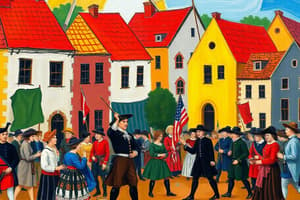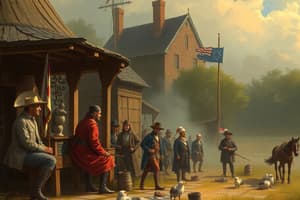Podcast
Questions and Answers
What did the Patriot Whigs base their imperial vision on?
What did the Patriot Whigs base their imperial vision on?
- Political influence
- Trade and manufacturing (correct)
- Land and resources
- Military power
Who wrote that colonists should have the same rights as those in Britain?
Who wrote that colonists should have the same rights as those in Britain?
James Otis
What role did colonial assemblies play after each colony was settled?
What role did colonial assemblies play after each colony was settled?
They taxed residents and managed spending.
Who influenced colonial thinking by stating that education was important?
Who influenced colonial thinking by stating that education was important?
What was the First Great Awakening?
What was the First Great Awakening?
Who was a traveling Calvinist preacher known for emotional sermons?
Who was a traveling Calvinist preacher known for emotional sermons?
What did the Sugar Act aim to stop?
What did the Sugar Act aim to stop?
What did the Currency Act restrict colonies from producing?
What did the Currency Act restrict colonies from producing?
What was required to be printed on documents according to the Stamp Act?
What was required to be printed on documents according to the Stamp Act?
What are internal taxes?
What are internal taxes?
What was the purpose of the Virginia Resolves?
What was the purpose of the Virginia Resolves?
Who defended the soldiers involved in the Boston Massacre?
Who defended the soldiers involved in the Boston Massacre?
What did the Stamp Act Congress declare?
What did the Stamp Act Congress declare?
Colonists believed in the concept of virtual representation.
Colonists believed in the concept of virtual representation.
What were non-importation agreements?
What were non-importation agreements?
What group was organized to resist the Stamp Act?
What group was organized to resist the Stamp Act?
What did the Declaratory Act assert?
What did the Declaratory Act assert?
What did the Townshend Acts create?
What did the Townshend Acts create?
Who wrote 'Letters from a Pennsylvania Farmer'?
Who wrote 'Letters from a Pennsylvania Farmer'?
What was the Boston Massacre?
What was the Boston Massacre?
Who created propaganda about the Boston Massacre?
Who created propaganda about the Boston Massacre?
What was the Tea Act passed to help?
What was the Tea Act passed to help?
What did the Boston Tea Party involve?
What did the Boston Tea Party involve?
What was significant about the Continental Congress?
What was significant about the Continental Congress?
What did the Olive Branch Petition state?
What did the Olive Branch Petition state?
Who wrote 'Common Sense'?
Who wrote 'Common Sense'?
What did Lord Dunmore's Proclamation offer?
What did Lord Dunmore's Proclamation offer?
What did Richard Henry Lee declare?
What did Richard Henry Lee declare?
Who wrote the actual Declaration of Independence?
Who wrote the actual Declaration of Independence?
Who were the Hessians?
Who were the Hessians?
What was the outcome of the Battle of Saratoga?
What was the outcome of the Battle of Saratoga?
What marked the end of the American Revolutionary War?
What marked the end of the American Revolutionary War?
What did the Treaty of Paris 1783 accomplish?
What did the Treaty of Paris 1783 accomplish?
What radical new ideals justified the creation of a new nation?
What radical new ideals justified the creation of a new nation?
Flashcards are hidden until you start studying
Study Notes
Patriot Whigs
- Advocated for an imperial vision centered on trade and manufacturing, challenging land and resource-based dominance.
- Believed in equal status for colonies and Britain, proposing economic growth as a solution to national debt.
James Otis
- Asserted colonists' rights, arguing they should receive the same rights as British citizens, if not more.
Colonial Assemblies
- Functioned like the British House of Commons, taxing residents, managing revenues, and paying royal officers.
- Colonists favored these assemblies, seeking recognition from Britain, which opposed them.
John Locke
- Influenced colonial thought by highlighting the impact of environment on individuals.
- Proposed that aristocratic success stemmed from education, wealth access, and patronage, stressing the significance of education.
First Great Awakening
- Religious revival in the colonies from the 1730s to the 1770s, emphasizing individual significance.
- Intersected with Enlightenment and deist ideas, enhancing personal spirituality.
George Whitefield
- Traveling preacher known for emotional sermons stressing personal responsibility in one's relationship with God.
- Promoted the concept of a "conversion" experience, critiquing unqualified ministers.
Sugar Act
- Aimed to reduce molasses smuggling in New England by lowering duties but enhancing enforcement.
- Smugglers were tried in vice-admiralty courts.
Currency Act
- Restricted colonies from producing paper money, worsening their economic woes post-war due to a shortage of gold and silver.
Stamp Act
- Required documents to be printed on taxed paper, marking the first direct tax by Parliament and inciting significant colonial resistance.
Internal vs External Taxes
- Internal taxes: levied directly by Parliament; External taxes: customs duties contributing to the empire's revenue.
Virginia Resolves
- Anti-Stamp Act resolutions asserting colonists’ rights akin to British subjects and claiming only colonial assemblies could tax them.
Patrick Henry
- Key figure in advocating against British taxation, recognized for his radical stances during the colonial resistance.
Stamp Act Congress
- Assembly of delegates from nine colonies asserting loyalty to the king while claiming the right to be taxed only by their own assemblies.
Virtual Representation
- British claim that colonial interests were represented in Parliament, which colonists contested vehemently.
Non-importation Agreements
- Colonial merchants boycotted British goods in response to the Stamp Act, prompting British merchants to lobby for its repeal.
Sons of Liberty
- Organized groups in the colonies promoting resistance against British taxation and oppressive acts.
Declaratory Act
- Legislation confirming British authority to legislate for the colonies after repealing the Stamp Act.
Townshend Acts
- Imposed customs duties on imported goods and established stricter measures for enforcement, incentivizing customs officers.
Vice Admiralty Courts
- Created under the Townshend Acts to prosecute smugglers, circumventing regular jury trials.
Letters from a Pennsylvania Farmer
- John Dickinson argued for acceptable duties for trade regulation, opposing revenue-based taxation imposed by Britain.
Homespun Protest
- Movement encouraging the use of locally made clothing to oppose British textile imports.
Committees of Correspondence
- Networks formed among colonies to share resistance strategies and news of British actions.
Boston Massacre
- Incident where British soldiers shot into a crowd of Bostonians, resulting in five civilian deaths, escalating tensions.
Paul Revere
- Created propaganda depicting the Boston Massacre, fueling colonial outrage against British authority.
John Adams
- Defended British soldiers involved in the Boston Massacre, contributing to their eventual acquittal.
Crispus Attucks
- A former slave and dockworker, he was among the first casualties in the Boston Massacre, symbolizing resistance.
Tea Act
- Targeted to assist the East India Company, it consistently met colonial resistance despite lowering duty costs, seen as an acceptance of British taxation.
Samuel Adams
- Leader of Boston’s Sons of Liberty, orchestrating efforts to block British tea shipments to avoid tax payments.
John Hancock
- Co-led resistance efforts in Boston against the landing of tea ships, playing a critical role in colonial protests.
Boston Tea Party
- Protest event where colonists, disguised as Mohawk Indians, dumped tea into Boston Harbor in defiance of British tax.
Edenton Tea Party
- Similar protest in Edenton where tea was either dumped or seized, expressing opposition to British tea taxes.
Coercive Acts
- Series of four punitive measures aimed at quelling the Boston rebellion, including shutting down Boston Harbor and altering Massachusetts governance.
Continental Congress
- Gathering of delegates to unify colonial response against British treatment, insisting on rights similar to British subjects, such as representation and trial by jury.
Continental Association
- A document from the Continental Congress voicing colonial discontent with British oppression, promoting unity and moral grounds for resistance.
Battle of Lexington and Concord
- First military engagements of the Revolutionary War; local militias confronted British troops, marking the start of armed conflict.
"Shot heard 'round the world'"
- Phrase symbolizing the start of the Revolutionary War, representing the first percussion of resistance against British rule.
Thomas Jefferson
- Radical delegate from Virginia to the Continental Congress, later instrumental in drafting the Declaration of Independence.
Olive Branch Petition
- Moderate attempt to appeal to Britain for resolution and harmony, expressing a desire to avoid conflict.
Thomas Paine
- Authored "Common Sense," openly criticizing monarchy and British imperial logic, widely circulated for its persuasive language and arguments.
Lord Dunmore's Proclamation
- Declared martial law offering freedom to indentured servants and slaves joining the British army, inciting fear among Southern whites.
Richard Henry Lee
- Declared the complete severance of ties between Britain and the American colonies, urging independence.
Declaration of Independence
- Document created primarily by Jefferson outlining colonial grievances against Britain and affirming natural rights as justification for independence.
Hessians
- German mercenaries contracted by Britain, serving as hired soldiers during the Revolutionary War.
Battle of Trenton
- Washington's surprise victory against Hessians, revitalizing American morale and recruitment efforts.
Battle of Saratoga
- Major American victory that convinced France to support the colonies against Britain, shifting the war's momentum.
Battle of Yorktown
- Final significant battle where combined American and French forces trapped British troops, leading to their surrender and effectively ending the war.
Treaty of Paris 1783
- Ceased hostilities formally, but failed to uphold protections for Loyalists or prevent capture of escaped slaves by British forces.
Revolutionaries justified their new nation with
- Progressive ideals that ignited a global wave of revolutions, emphasizing liberty and self-governance.
Studying That Suits You
Use AI to generate personalized quizzes and flashcards to suit your learning preferences.





